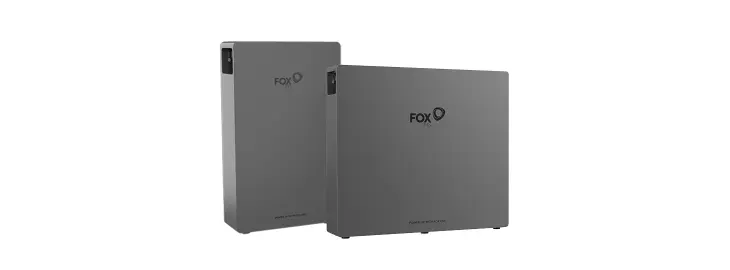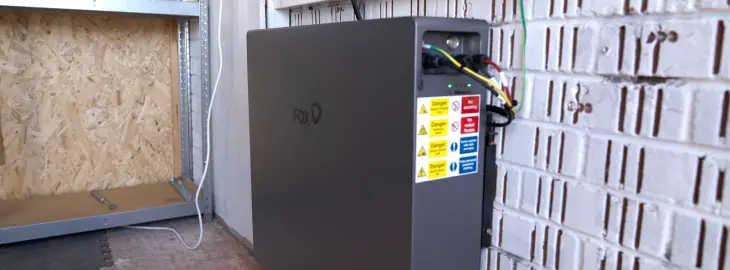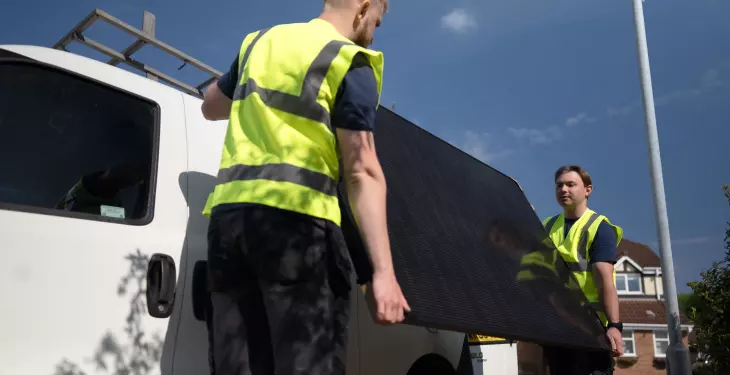

Written by Bethany Armstrong
Renewables Manager
Updated: 5th January, 2026
Your ideal solar battery size depends on your energy use and solar setup. This guide covers typical UK sizes, costs, and how to choose the right one.
See how much you could save with a solar & battery quote.
A solar battery stores the electricity your panels produce during the day so you can use it later when generation drops.
This means you rely less on grid power and make the most of your renewable energy.
The right battery capacity ensures you store enough energy to cover your needs without paying for unused space.
Undersized systems may discharge too early, while oversized ones increase upfront cost and extend payback time.
Across the UK, most domestic solar batteries range from 3 kWh to 15 kWh.
Home type | Typical battery size | Example use |
Flat or 1-2 bed | 3-5 kWh | Lighting, small appliances |
3-bed average | 5-10 kWh | Day-to-night energy use |
Large home or EV | 10-15 kWh | Whole-home backup, vehicle charging |
Check your electricity bill to find your average daily use in kWh.
A good rule of thumb is to store enough power to run your evening and overnight needs when your panels aren’t generating.
A 5 kWh battery can supply several hours of lighting and appliances for a small home.
A 10 kWh battery can typically power a 3-bed home overnight, including essentials such as the fridge and washing machine.

According to Ofgem, the average UK household uses 8-10 kWh per day.
Homes with higher consumption or electric heating usually benefit from a larger 10-15 kWh battery.
A 4 kW solar array generates roughly 16 kWh on a sunny summer day and 6-8 kWh in winter.
Matching battery capacity to your system’s output ensures you can store most of what you produce.
Higher-quality lithium-ion batteries allow deeper discharges.
This means you can use more of their total capacity each cycle. Look for models with 90% or higher efficiency for better value.
Modern lithium-ion batteries usually last 10-15 years and include 10-year manufacturer warranties.
iHeat only installs systems that meet recognised UK standards and carry strong warranty protection.
If you plan to buy an EV or expand your solar system later, choosing a slightly larger battery gives flexibility for extra energy use.
Battery size | Suitable home type | Approx. usable capacity | Typical cost range | Estimated backup time | Best suited for |
3-5 kWh | Flat or 1-2 bed | 80-90% usable | £2,000-£3,500 | 3-5 hours | Daytime workers |
5-10 kWh | 3-bed average | 85-90% usable | £3,500-£6,500 | 6-10 hours | Families at home evenings |
10-15 kWh | Large home or EV | 85-95% usable | £6,500-£9,000 | 10-15 hours | High-usage homes |
Figures represent typical UK averages in 2026 and vary by brand, setup, and installer.
If your panels produce limited energy or you have low evening demand, a smaller battery provides better cycling and quicker returns.

Homes with higher usage or EV charging benefit from larger batteries.
They offer longer backup times and higher energy independence, though with higher initial cost.
Check your average daily energy use (in kWh) from your bill.
Multiply your system’s solar output (kW) by expected sunlight hours.
Decide how much of that energy you want to store for use after sunset.
Choose a battery that stores roughly 70-100% of that usable energy.
A 4 kW solar system producing 16 kWh per day in summer and 7 kWh in winter would pair well with a 6-8 kWh battery, covering evening use and storing surplus power for the morning.
Installer tip: Most homeowners use only 60-70% of their solar generation directly.
A well-sized battery captures the rest, improving savings and system payback.

iHeat installs both solar panels and battery storage nationwide, available either together or separately.
As a Which? Trusted Trader with thousands of verified reviews, iHeat helps homeowners choose the ideal setup based on energy use, budget, and long-term goals.
With 0% APR finance available, iHeat makes it easier to install solar batteries without a large upfront payment.
All systems are installed by qualified engineers and include full product warranties for peace of mind.
The ideal solar battery balances cost, capacity, and usage.
For most homes, 5-10 kWh offers the best mix of savings and independence.
Larger batteries suit high-consumption properties or homes planning for EV charging.
Battery technology continues to improve, and prices are becoming more competitive.
With expert installation and finance options from iHeat, UK homeowners can enjoy efficient, long-lasting storage that maximises solar power throughout the year.
Last updated: 5th January, 2026

Written by Bethany Armstrong
Renewables Manager at iHeat
Bethany Armstrong is a renewables expert and operations manager at iHeat, specialising in heat pump solutions and solar project delivery across the UK.
LinkedInArticles by Bethany Armstrong are reviewed by iHeat’s technical team to ensure accuracy and reliability.

20th February, 2026
Yes, you can install home battery storage without solar panels in the UK. A battery-only s...
 Read Article
Read Article

19th February, 2026
Your Distribution Network Operator is the regional company that owns and manages the elect...
 Read Article
Read Article

06th January, 2026
These grants not only help residents save money on installation but also help lower energy...
 Read Article
Read Article
No obligation. Takes less than 60 seconds.